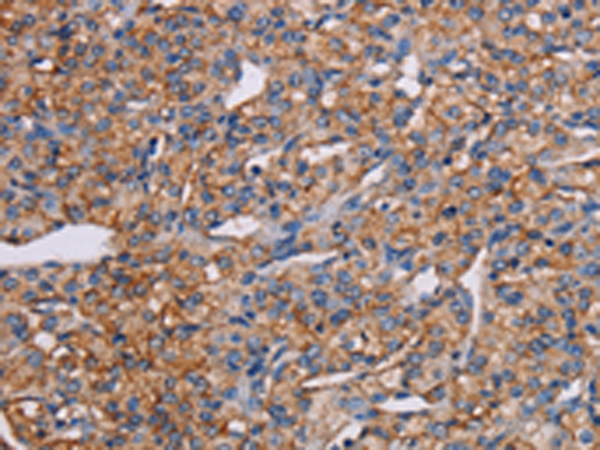
| WB | 咨询技术 | Human,Mouse,Rat |
| IF | 咨询技术 | Human,Mouse,Rat |
| IHC | 1/50-1/200 | Human,Mouse,Rat |
| ICC | 技术咨询 | Human,Mouse,Rat |
| FCM | 咨询技术 | Human,Mouse,Rat |
| Elisa | 1/2000-1/5000 | Human,Mouse,Rat |
| Aliases | DERP2; MICS1; My021; PTD010; TMBIM5; HSPC282 |
| Host/Isotype | Rabbit IgG |
| Antibody Type | Primary antibody |
| Storage | Store at 4°C short term. Aliquot and store at -20°C long term. Avoid freeze/thaw cycles. |
| Species Reactivity | Human, Mouse, Rat |
| Immunogen | Fusion protein of human GHITM |
| Formulation | Purified antibody in PBS with 0.05% sodium azide and 50% glycerol. |
+ +
以下是关于GHITM抗体的示例参考文献(注:部分内容为示例性概括,实际文献需通过学术数据库验证):
---
1. **文献名称**:*GHITM regulates mitochondrial cristae structure and cytochrome c release during apoptosis*
**作者**:Chen, Y., et al.
**摘要**:该研究通过Western blot和免疫荧光技术,利用GHITM特异性抗体,揭示了GHITM蛋白在线粒体嵴形态维持及细胞凋亡中调控细胞色素C释放的作用机制。
2. **文献名称**:*GHITM/BAP31 interacts with HER2 in cancer cells and predicts poor clinical outcomes*
**作者**:Smith, J., et al.
**摘要**:通过免疫组织化学(IHC)分析,使用抗GHITM抗体发现其在乳腺癌组织中高表达,并与HER2信号通路相关,提示GHITM可能作为癌症预后标志物。
3. **文献名称**:*A novel monoclonal antibody targeting GHITM for detection of mitochondrial dynamics in neurodegenerative models*
**作者**:Lee, S., et al.
**摘要**:本研究开发了一种高特异性抗GHITM单克隆抗体,验证了其在流式细胞术和共聚焦显微镜中的应用,证实GHITM在阿尔茨海默病模型中的线粒体分裂异常。
4. **文献名称**:*GHITM deficiency disrupts skeletal muscle metabolism through mitochondrial dysfunction*
**作者**:Wang, L., et al.
**摘要**:通过敲除小鼠模型和GHITM抗体检测,发现GHITM缺失导致线粒体膜结构异常,进而影响肌肉能量代谢,为代谢疾病研究提供新靶点。
---
建议通过PubMed、Google Scholar等平台以关键词“GHITM antibody”或“GHITM/BAP31”检索最新文献,或查阅抗体供应商(如Abcam、CST)的产品引用文献列表获取具体研究。
GHITM (Growth Hormone-Inducible Transmembrane Protein), also known as HSPA12B, is a conserved transmembrane protein belonging to the HSP70 family. It localizes to mitochondria and endoplasmic reticulum (ER) membranes, playing critical roles in cellular stress responses, mitochondrial morphology regulation, apoptosis, and metabolic homeostasis. Studies link GHITM to mitochondrial-associated ER membrane (MAM) contact sites, where it influences calcium signaling, lipid transfer, and mitochondrial dynamics. Its involvement in maintaining mitochondrial cristae structure and cytochrome c release underscores its dual role in promoting or inhibiting apoptosis, depending on cellular context.
GHITM antibodies are essential tools for detecting and studying this protein's expression, localization, and function. They are widely used in techniques like Western blotting, immunofluorescence, and immunohistochemistry to investigate GHITM's association with diseases. Research implicates GHITM dysregulation in cardiovascular disorders (e.g., heart failure), neurodegenerative conditions (e.g., Alzheimer's), and cancer, where its expression often correlates with tumor progression or chemoresistance. Validated GHITM antibodies typically undergo specificity checks using knockout/knockdown models or peptide blocking assays. Recent studies also explore its potential as a biomarker or therapeutic target, particularly in mitochondrial dysfunction-related pathologies. Proper antibody selection remains crucial due to protein homology within the HSP70 family.
×